|
|
|
Sort Order |
|
|
|
Items / Page
|
|
|
|
|
|
|
| Srl | Item |
| 1 |
ID:
170604
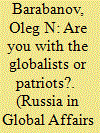

|
|
|
| 2 |
ID:
170603


|
|
|
|
|
| Summary/Abstract |
Only a strong and well-considered relationship between Russia and China can constitute a powerful enough global counterweight to the unipolarity and the United States’ strategic offensive posture, and also act as a midwife in the birth of an undeniably multipolar world order.
|
|
|
|
|
|
|
|
|
|
|
|
|
|
|
|
| 3 |
ID:
170598
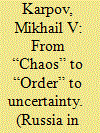

|
|
|
|
|
| Summary/Abstract |
The article describes how social and political changes in post-Soviet Russia over the past quarter of a century have been read and assessed by Chinese experts in relevant fundamental monographs. Each of the monographs considered herein, published in China twelve years apart, reviews different stages in the evolution of Chinese experts’ approach towards Russia, and states their analytical, ideological and political conclusions. Generally speaking, China’s sociopolitical Russian studies have evolved from the ideologically motivated resentment against the Soviet Union’s dissolution, the disbandment of its Communist Party and the ensuing shock reforms of the 1990s to the recognition of irreversible changes in Russia and “legitimization” of the Russian leadership in the 2000s-2010s. However, by the end of the current decade, the topic of uncertainty about Russia’s future sociopolitical and economic development has once again surfaced in some key publications along with increasingly “panegyrical” assessments of the Russian president.
|
|
|
|
|
|
|
|
|
|
|
|
|
|
|
|
| 4 |
ID:
170602
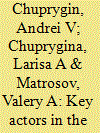

|
|
|
|
|
| Summary/Abstract |
This article attempts to analyze the current political situation in Libya through the activities of the main actors and a net of opportunistic interactions they create on the national and international levels. The paper scrutinizes Libya’s three governments and the tribal factor, and also considers the role of neocons who have recently entered the political milieu and claim their stakes in the future of the country. An attempt is made to look at international relations theories, specifically the realist conception and the liberal interdependence narrative, and their holistic approach to the state, through the lens of their applicability to the Libyan case, in order to understand the Libyan puzzle and forecast its future development. The study also includes an analysis of the diversity of national and international centers of power in Libya, including existing tribes and clans, and their involvement in the crisis. An effort is made to formulate relevant arguments for future debate, which, in our opinion, is inevitable.
|
|
|
|
|
|
|
|
|
|
|
|
|
|
|
|
| 5 |
ID:
170597


|
|
|
|
|
| Summary/Abstract |
Interaction and long-term strategies are essential in today’s globalized world, yet both Russia’s foreign policy and its relations with its Western partners are deteriorating. The Russian government frequently sends out controversial messages: from sovereignty, its own agenda, and “a turn to the East,” to coherent integration with the global, or Western, agenda. This is especially true when it comes to education. Russians are highly educated; thus, education is automatically perceived as a soft power tool. However, in reality, major obstacles can emerge. The paper analyzes perceptions and attitudes of foreign students towards Russia: its image, political system, and role in the contemporary world. A survey conducted in 2017 (online and offline, half-closed anonymous questionnaire N100) involved foreign students, some of whom studied at Russian higher education institutions and some who did not. The students were asked about how they perceived Russia’s role in the modern world, its soft power resources, political regime, and values. The research revealed a clear difference in the perception of those factors. It also showed that educational migration sometimes provides unexpected results that can contradict the aims of Russian education policy
|
|
|
|
|
|
|
|
|
|
|
|
|
|
|
|
| 6 |
ID:
170600


|
|
|
|
|
| Summary/Abstract |
This article examines the impact of the crisis in Russia-EU relations on the European Union’s articulation of the resilience concept and analyzes how its incorporation into the EU Global Strategy has affected the Brussels-Moscow relationship. Academic concepts of resilience and constructivism provided the theoretical basis for the research. The study of academic works made it possible to identify basic characteristics of resilience. This is an analytical (not normative) attribute of any system, and it is focused on the resources needed to overcome threats rather than on threats as such, with both threats and resources being inherent in the system. The study of the European Union’s discourse shows that it has interpreted of resilience as a new norm (ascribed to democratic regimes only), with emphasis on threats rather than resources. These differences were caused, among other things, by the ongoing crisis in relations between the EU and Russia. Resilience as a new norm allows the EU to emphasize Russia’s “otherness” and thus assert its own identity as a normative leader. The focus on threats sets out a clear action plan for fighting threats associated with Russia. In Eastern Europe, resilience based on common threats emanating from Russia reinforces the EU’s approach towards transformations launched in these countries earlier. So, despite its theoretical potential, resilience, as construed by the European Union, does not allow Russia and the EU to overcome the current crisis in their relations.
|
|
|
|
|
|
|
|
|
|
|
|
|
|
|
|
| 7 |
ID:
170599


|
|
|
|
|
| Summary/Abstract |
The present paper discusses the so-called “Russian factor” in the political development of Japan over a period from the late 19th century till the present day. The rise and fall of Japan as a “great power” in the 20th century is tightly linked with its relations with Russia (the Russian Empire and the USSR), which became a specific factor of the Japanese imperial project. Russia served as a challenge to Japan that triggered its social mobilization and militarization in 1895-1905. The victorious Russo-Japanese War made Japan a “great power” with colonies on the continent. However, it also predetermined the political rise of its military circles, which ultimately worked as a time bomb breaking the foundation of the newborn empire. Cooperation with Russia after 1906 was the most effective instrument for Japan’s further expansion on the continent, while the intervention into Siberia after 1917 came as the first alarm signaling the limits of that expansion. The paper also examines the harsh geopolitical rivalry between the two countries during the 1930s, “strange neutrality” during WWII, and the Soviet-Japanese war in August 1945 as the final factor that brought Japan to a surrender and drove the final nail in the coffin of its imperial project. The study shows an unprecedented transformation of Russia’s image in Japan over the years and analyzes the Russo-Japanese territorial dispute in a new perspective.
|
|
|
|
|
|
|
|
|
|
|
|
|
|
|
|
| 8 |
ID:
170601
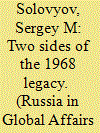

|
|
|
|
|
| Summary/Abstract |
Abstract This article analyzes two responses by the Left to the turbulent events of 1968 in Europe and the failed attempt at revolution: the turn towards postmodern theory and the “minorities policy” is contrasted with the transition to urban guerilla warfare. The paper argues that the theoretical degradation of a considerable part of leftist thought after 1968 was a result of the transition to postmodernist attitudes. The article also analyzes the penetration of these trends into the concept of sociologist Immanuel Wallerstein, one of the most influential left-wing theorists. The article traces the logic behind the emergence of urban guerillas in Europe and the causes of their defeat. By analyzing both the postmodern and ultra-radical experience, the author offers some conclusions regarding the current situation and the future of Europe’s Left.
|
|
|
|
|
|
|
|
|
|
|
|
|
|
|
|
| 9 |
ID:
170596
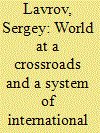

|
|
|
|
|
| Summary/Abstract |
Next year we will celebrate two great and interconnected anniversaries—the 75th Anniversary of the Victory in the Great Patriotic and Second World Wars, and the establishment of the UN. Reflecting on the spiritual and moral significance of these landmark events, one needs to bear in mind the enormous political meaning of the victory that ended one of the most brutal wars in the history of mankind
|
|
|
|
|
|
|
|
|
|
|
|
|
|
|
|
|
|
|
|
|